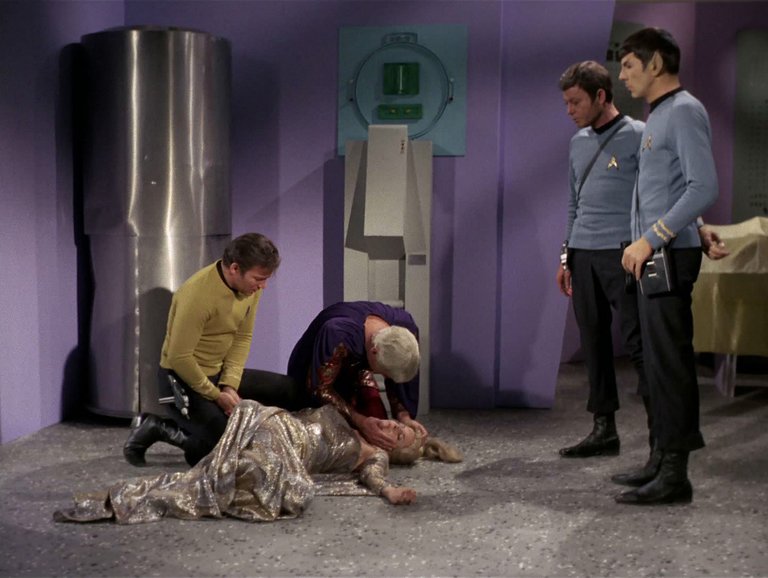
Requiem for Methuselah (S03E21)
Airdate: February 14th 1969
Written by: Jerome Bixby
Directed by: Murray Golden
Running Time: 50 minutes
The Star Trek: The Original Series (TOS) is often lauded for its bold exploration of human themes, from the ethical dilemmas of artificial intelligence to the complexities of human emotion. While Star Trek: The Next Generation (ST:NG) introduced Data, a character who epitomised the tension between human and machine, the Original Series had already begun to grapple with similar philosophical questions. Among its many episodes, Requiem for the Methusaleh stands out as a bold, ambitious attempt to delve into the essence of humanity, albeit one that fell short of classic status.
The episode opens with the USS Enterprise crew infected by Rigelian fever, a rare and deadly infectious disease that has already claimed three lives. The threat is immediate and dire: the only known cure, ryetalyn, is located on the uninhabited planet Holberg 917-G. Kirk and his away team are sent to secure the substance, but their mission takes an unexpected turn when they encounter a hostile robot and a mysterious, enigmatic figure named Flint (played by James Daly). Flint, a man of immense wealth, taste, and intellect, initially resists helping the Enterprise but eventually agrees to assist, insisting that McCoy extract ryetalyn in his laboratory. During this exchange, Flint’s luxurious home is revealed, showcasing his vast resources and eclectic interests. He also introduces his adopted daughter, Rayna Kapec (Louise Sorel), a character who immediately captures Kirk’s attention, mirroring the latter’s fascination with her.
Flint’s backstory is both intriguing and unsettling: he is nearly 6,000 years old, a result of a genetic mutation that granted him an extraordinary lifespan. Over millennia, he has assumed the identities of historical figures, accumulating knowledge and talents across cultures and eras. His age and longevity, however, are juxtaposed with the fleeting, fragile nature of his adopted daughter Rayna. Their relationship, though initially tender, takes a dark turn when the Enterprise crew uncovers Rayna’s secret—a dark, tragic truth that exposes the emotional and ethical complexities of her existence. This revelation underscores the episode’s central theme: the struggle to define humanity in the face of longevity, transience, and the moral ambiguities of love and legacy.
The episode’s production values are mixed. While some fans praise its special effects, which, though dated by modern standards, were innovative for their time, others criticize its reliance on formulaic storytelling. The episode’s script, penned by veteran science fiction writer Jerome Bixby, is ambitious in its ambition, drawing inspiration from Shakespeare’s The Tempest and the 1956 sci-fi classic Forbidden Planet. However, these influences are not fully original, and the plot’s reliance on these references feels more like a homage than a creative breakthrough. The episode’s melodramatic tone, however, is a double-edged sword. The tragic ending, in which Rayna succumbs to the emotional weight of her relationships, is both haunting and unrelenting. Spock’s intervention, using the Vulcan nerve pinch to help Kirk cope with grief, is a poignant moment that underscores the show’s willingness to explore the darker aspects of human emotion.
Critics, however, have pointed to the episode’s handling of Kirk’s character as problematic. Kirk’s instant infatuation with Rayna, a deviation from his usual professionalism, creates an over-the-top, melodramatic conflict that undermines the episode’s thematic depth. This contrast with Kirk’s later, more restrained portrayals in The Animated Series and the films is jarring, highlighting the episode’s inconsistency in character development.
The episode’s reception is divided. Some viewers, particularly those who appreciate the show’s willingness to take risks, praise its boldness and the performances of James Daly as Flint and Louise Sorel as Rayna. Daly, a seasoned actor, brings a nuanced, almost tragic gravitas to Flint, while Sorel’s portrayal of Rayna is both vulnerable and compelling. However, the actors’ initial skepticism of the concept—viewing it as a silly idea—adds an ironic layer to the episode’s legacy. This tension between the episode’s ambition and its perceived absurdity is a recurring theme in TOS, where even the most ambitious episodes are often met with mixed reactions.
Interestingly, the episode’s concept of Flint, a man who has lived for millennia and assumed countless identities, would later influence Bixby’s final work, the 2007 film Man from Earth. This connection underscores the episode’s enduring impact, even if it remains a footnote in the broader Star Trek canon. Despite its flaws, Requiem for the Methusaleh is a significant episode that reflects the Original Series’ commitment to exploring the human condition.
RATING: 6/10 (++)
Blog in Croatian https://draxblog.com
Blog in English https://draxreview.wordpress.com/
InLeo blog https://inleo.io/@drax.leo
LeoDex: https://leodex.io/?ref=drax
InLeo: https://inleo.io/signup?referral=drax.leo
Hiveonboard: https://hiveonboard.com?ref=drax
Rising Star game: https://www.risingstargame.com?referrer=drax
1Inch: https://1inch.exchange/#/r/0x83823d8CCB74F828148258BB4457642124b1328e
BTC donations: 1EWxiMiP6iiG9rger3NuUSd6HByaxQWafG
ETH donations: 0xB305F144323b99e6f8b1d66f5D7DE78B498C32A7
BCH donations: qpvxw0jax79lhmvlgcldkzpqanf03r9cjv8y6gtmk9